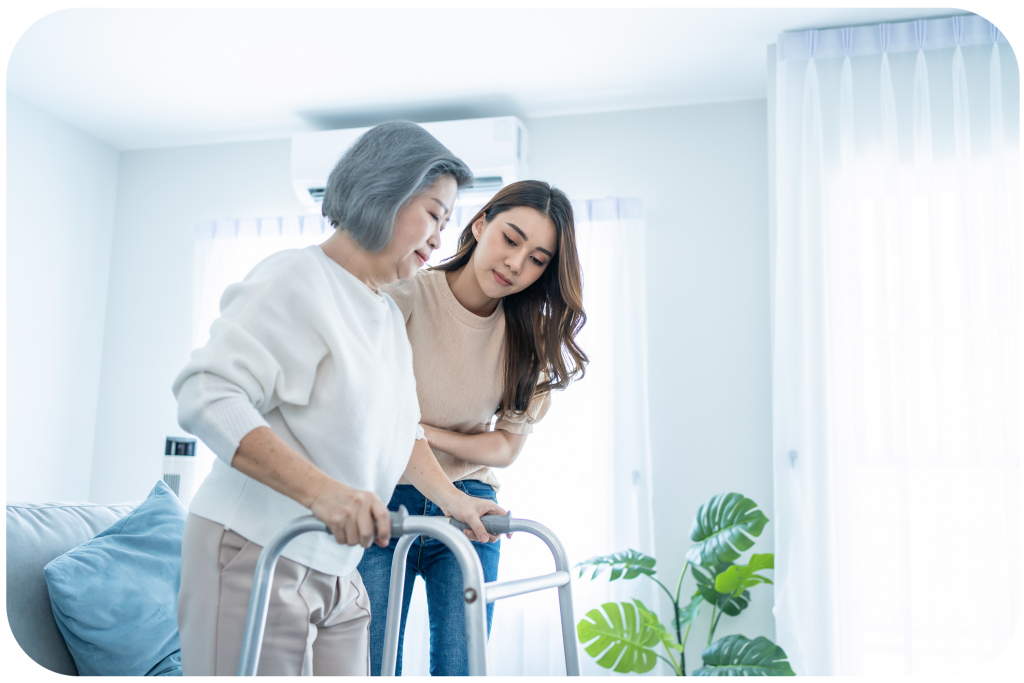A Caregiver’s Guide to Supporting A Loved One Living With Dementia
There are 10 million new cases of dementia every year worldwide, meaning someone is diagnosed with dementia every 3.2 seconds. If your loved one has recently been diagnosed with Alzheimer’s or another form of dementia, you might be wondering what you can do to support them.
To help you on your journey as a caregiver, Town Square has put together this guide on supporting seniors with dementia. Read on to learn everyday care partner tips for those whose loved one has a cognitive condition, or contact us today to learn more about our therapeutic, socially engaging, and joyous adult day services.
How to Be a Good Caregiver for Those with Dementia
According to the Alzheimer’s Association, the profound loss of a person’s ability to register new information or stimulus can lead to feelings of anxiety and agitation. There’s also a sense of worry about the future that comes with being diagnosed.
As a care partner, you can be an invaluable source of constancy by trying to reduce frustrations and creating an environment that feels safe, stable, and comforting.
- Reduce frustrations by setting up a well-structured schedule. Having meals at the same time every day and creating time for things like exercise, socialization, and quiet can help your loved one feel more at ease.
- Place photos of fond memories and other well-loved objects around the house, giving your loved one an anchor in their daily life. For example, set a familiar quilt on the couch and place their favorite coffee or tea cup on the table when they eat. Even ordinary objects like these can put someone with a cognitive condition at ease.
- Make sure the home environment is safe. Remove things that could cause trips, ensure hallways and corridors are well-lit, and make it easy to find the everyday things your loved one may need to get for themselves, such as toiletries, clothing, and dishware.
- Build some quiet time into every day. This might be an hour for painting, coloring, or playing cards. Make sure your loved one has time to relax and unwind so you both can focus solely on the present rather than worrying about the future.
- Exercise can also help to relieve stress and anxiety in those with dementia. You can walk with your loved one around the neighborhood or go to a tranquil area like a park.
No matter what, approach caregiving with patience and flexibility. Your loved one might act upset or irritated despite your best efforts. That’s okay: Take a deep breath, be patient with them, and go with the flow.

Tips for Everyday Dementia Care
Everyone’s experience with dementia is different, but it’s helpful to know these tips for handling common situations that may arise as you act as your loved one’s care partner.

Understand the Signs and Symptoms of Dementia
A person with dementia might struggle to find words, feel frustrated with complex tasks, or struggle to plan ahead beyond that morning or afternoon. You should always support your loved one in their independence, but as the symptoms of dementia progress, know where to step in to help more. For example, seniors with Alzheimer’s or other forms of dementia might have limited spatial awareness, so someone may need to help them navigate their home and neighborhood.
Provide Opportunities for Social Interaction
Dementia can be incredibly isolating, leading to feelings of loneliness and depression. To combat this, integrate socialization into their routine. For example, you may want to bring your loved one to community events so they can be around people. Town Square’s immersive adult day centers offer people with dementia the chance to form beneficial social bonds with their peers through our reminiscence-focused programming.


Be Mindful of Sensory Issues
People with dementia have to work harder to make sense of the world around them, so they may not be well-served by an overly stimulating environment. This is why avoiding loud sounds, turning the television off and playing gentle music instead, and creating an environment free from intense temperatures, smells, and lights can help them feel more at ease.
Tips for Dementia-Related Changes in Communication and Behavior
Alzheimer’s and other forms of dementia progress over time. So your loved one will eventually exhibit changes in their communication abilities and behaviors. What should you do when this happens?
When communicating with someone with dementia, be as clear as possible. Use simple sentences and words. Speak in a reassuring tone, and be willing to repeat your statement or question until your loved one understands.
When having a conversation, it’s also important to maintain eye contact and allow your loved one time to digest what you’re saying and respond. It’s a process, but with patience, you can communicate without anyone feeling frustrated or confused.
Self-Care for Caregivers of People with Dementia
There’s no question that caring for a loved one with dementia requires a huge amount of energy and effort. That’s why it’s critical that you also take care of your well-being. You can only be a good caregiver when you’re able to cope with the challenges and handle your responsibilities.
Identify ways to manage your own stress, such as exercise, meditation, or even just taking an hour each day to do something you love.
You also need support. Don’t be afraid to ask your family and loved ones for help. Consider getting professional assistance to help you make decisions and provide more advanced care when your loved one requires more supervision.
And finally, use the resources available to you. You can talk with your loved one’s doctor for their advice. You can also get advice from organizations, such as the Alzheimer’s Association and the Alzheimer’s Foundation of America.
The team at Town Square is also always here to help. Our reminiscence-focused senior day centers are located across the country, from Texas and Florida to New Jersey and Maryland. View our locations or contact us to find out more about how we help our members and their families thrive.



